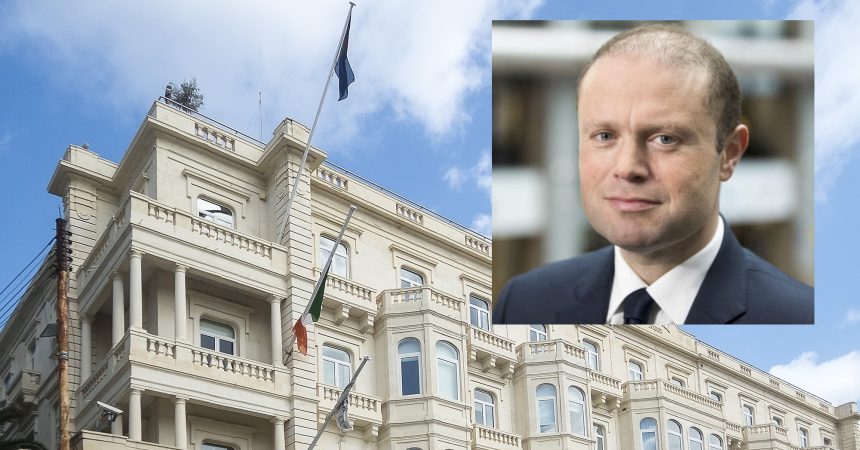Prime Minister Joseph Muscat has tried to shrug off suggestions that he is responsible for the Pilatus Bank mess by putting the ball in the Maltese financial regulator’s court.
Doorstepped outside his office in Valletta just a few hours after the arrest in the US of Pilatus Bank owner Ali Sadr, who was charged on Tuesday with money laundering and evading sanctions, Muscat said that he has no authority over such matters and only the Malta Financial Services Authority (MFSA) supervisory council can decide on whether the bank’s licence should be revoked.
A few seconds later he even implied that the responsibility should be shouldered by the previous PN administration since the application process of the bank started before he was elected to office.
“What worries me is that the bank started the application under the PN,” he said, adding that the licence was issued by the very same MFSA board which he left in place after being elected in 2013.
In other words, Muscat is saying that while he has no authority to tell the MFSA what to do, the former PN government should be held responsible for the mess. Tangled logic at its best, political posturing at its worst.
Let’s start with the basics. In the act to amend the Malta Financial Services Authority Act presented the same day Ali Sadr was arrested, the government is entrenching the status quo. The MFSA chairman and its board members are all appointed by the Prime Minister while the CEO is appointed by the board members which are all appointed by the Prime Minister.
The opposition parties have no say whatsoever in who sits on the MFSA board and yet there seems to be no objections to the fact that the MFSA is solely accountable to the Prime Minister and not Parliament.
If all board members are appointed by the Prime Minister, they are answerable to the Prime Minister alone. If Muscat now believes that the Pilatus mess was enabled by the MFSA board appointed by the previous PN administration he is doubly guilty for re-appointing the same board.
However, the Pilatus mess goes beyond regulatory and legal provisions in place. On Wednesday the MFSA decided against revoking the bank’s licence and instead took control of Pilatus Bank.
Pilatus Bank is a bank at the centre of corruption scandals exposed by the murdered journalist Daphne Caruana Galizia and former Opposition Leader Simon Busuttil.
Following the allegations, the bank was subject to an investigation by Malta’s anti-money-laundering agency, the FIAU, which alleged that Pilatus Bank showed a “glaring, possibly deliberate disregard” for money-laundering controls.
The report also said that a much higher level of ongoing scrutiny is necessary in cases where there are transactions relating to PEPs from high risk jurisdictions.
“It appears that the Bank and its officials have gone to great lengths to protect the confidentiality of their clients. However, this has been done at the expense of carrying out the customer due diligence required by law,” the FIAU said.
The report also lambasted Pilatus Bank’s “high risk appetite” and said the compliance examination revealed that the bank “has a number of serious shortcomings. This not only places the bank in breach of several provisions of the PMLFTR (Prevention of Money Laundering and Funding of Terrorism Regulations), but also exposes the bank and the jurisdiction as a whole to a high level of risk, which is not being mitigated by any other process.
The serious deficiencies are compounded by the fact that the Bank’s profitability depends to a large extent on a few select clients who are PEPs, according to the report.
Pilatus denied any wrongdoing and has claimed that it fully adheres to all laws and regulations. However, despite the damning report, following a second investigation the FIAU had a change of heart and said the shortcomings it had identified in terms of compliance with money laundering laws “no longer subsist.” This was communicated in a letter to Pilatus Bank following the resignation of former FIAU director Manfred Galdes.
It doesn’t end there. The bank is also under investigation by the European Banking Authority following requests by the European Commission and the European Parliament.
In January, it was reported that the European Banking Authority is conducting “preliminary enquiries” into Pilatus Bank and will among others look into whether its licence should be revoked and examine whether the MFSA is able to do its job properly free from conflicts of interest.
Maltese MEP MEP David Casa presented further evidence of Pilatus Bank’s Anti-Money Laundering (AML) violations to the ECB.
In his letter to Supervisory Board Chair Danièle Nouy, Casa claimed that his conclusion from the information he received was that Pilatus Bank was not merely flouting Anti-Money Laundering laws but that it has been set-up specifically for that purpose.
Casa also called on the European Banking Authority to probe whether the MFSA was aware of criminal investigations on Sadr’s activities in Venezuela and whether the decision to grant the bank a banking licence was the result of favourable political interference by an official within the Muscat government.
Muscat cannot simply wash his hands of the Pilatus Bank mess. Not only is he politically responsible for the MFSA but his administration’s links to the bank are too close for comfort.
Somebody, somewhere must carry the responsibility for allowing a bank to operate under such circumstances. But with the FIAU, the police force and MFSA all unwilling to their job, we might never know the truth. And the crooks will get away with murder, as they have always done.












